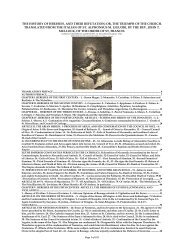The Writings of St. Francis of Assisi - + Saints' Works
The Writings of St. Francis of Assisi - + Saints' Works
The Writings of St. Francis of Assisi - + Saints' Works
You also want an ePaper? Increase the reach of your titles
YUMPU automatically turns print PDFs into web optimized ePapers that Google loves.
THE WRITINGS OF ST. FRANCIS OF ASSISI<br />
princes, laborers and farmers, servants and lords, all virgins and the continent and the married,<br />
the laity, men and women, all infants, adolescents, youth and elderly, the healthy and the infirm,<br />
all the small and great, and all peoples, clans, tribes and tongues (cf. Apoc 7:9), all nations and<br />
all men <strong>of</strong> whatever lands, who are and will be, that we may all persevere in the True Faith 439 and<br />
in penance, because no one can be saved otherwise. 440<br />
Let us all love (dilectio) "with all (our) heart, with all (our) soul, with all (our) mind, with<br />
all (our) virtue" (cf. Mt 12:30) "and fortitude" (cf. Mk 12:33), with all (our) intellect, and "with<br />
all (our) powers" (<strong>of</strong> soul and body) (cf. Lk 10:27), with all (our) effort, with all (our) affection,<br />
with all (our) inmost being, 441 with all (our) desires and willings, "the Lord God" (Mk 12:30),<br />
who gave and gives all <strong>of</strong> us (our) entire body, (our) entire soul and (our) entire life, He who<br />
created, redeemed, and by His mercy alone will save us (cf. Tob 13:5), He who had worked and<br />
works all good things for us miserable and wretched, putrid and fetid, ungrateful and evil (men).<br />
· <strong>The</strong>refore let us desire nothing other, let us want nothing other, may nothing other please and<br />
delight us except the Creator and Redeemer and Our Savior, the only True God, who is the Full<br />
Good, every good, wholly good, the True and Highest Good, who "alone" is "good" (cf. Lk<br />
18:19), faithful, meek, gentle and sweet, who alone is holy, just, true, holy and right, who alone<br />
is kind, innocent, clean, from whom and through whom and in whom (cf. Rm 11:36) is all<br />
pardon, all grace, all the glory <strong>of</strong> all the penitents and the just, <strong>of</strong> all the blessed rejoicing<br />
together in Heaven. · <strong>The</strong>refore let nothing impede, nothing separate, nothing come between (us<br />
and Him); · wherever all <strong>of</strong> us (are), in every place, at every hour and in every season, daily and<br />
continually, let us believe truly and humbly and hold in (our) heart and love (amor), honor,<br />
adore, serve, praise and bless, glorify and exalt above (all), magnify and give thanks to the Most<br />
High and Highest Eternal God, in Trinity and Unity, the Father and the Son and the Holy Spirit,<br />
the Creator <strong>of</strong> all and the Savior <strong>of</strong> all believing and hoping and loving (dilectio) Him, who is<br />
without beginning and without end, immutable, invisible, inexplicable, ineffable,<br />
incomprehensible, unsearchable (cf. Rm 11:33), blest, praiseworthy, glorious, exalted above (all)<br />
(cf. Dan 3:52), sublime, exalted, gentle, lovable (amor), delightful and wholly desirable above all<br />
439 i.e. the Faith <strong>of</strong> the Catholic Church.<br />
440 A reference to the Catholic Dogma Extra ecclesiam nulla salus, recently defined by the Fourth<br />
Lateran Council (1215 A.D.), in its constitution De Fide Catholica. That all men <strong>of</strong> good will<br />
have the possibility <strong>of</strong> salvation cf. Pope Paul VI, "Credo <strong>of</strong> the People <strong>of</strong> God"; but that this<br />
possibility is only actualized by membership in the Catholic Church, cf. also Council <strong>of</strong><br />
Florence, Denz. 714; Innocent III, Denz. 423; Boniface VIII, Denz. 468; Clement VI, Denz.<br />
570b; Benedict XIV, Denz. 1473; Pius IX, Denz. 1647, 1677; Leo XIII, Denz. 1955; Pius XII,<br />
"Mystici Corporis", Denz. 2286, 2288. See also Pius IX, Denz. 1647. <strong>St</strong>. Alphonsus dei Liguori,<br />
along with many theologians, having considered the absolute necessity <strong>of</strong> the salvation <strong>of</strong>fered<br />
by Christ, hold that those who die outside the Church and in invinceable ignorance, are<br />
condemned not for their ignorance <strong>of</strong> the True Faith, but for the sins against the natural law<br />
which they could not avoid without the aid <strong>of</strong> the True Faith and the Sacraments <strong>of</strong> the Church.<br />
<strong>St</strong>. <strong>Francis</strong> includes the virtue <strong>of</strong> "penance" along with "the True Faith" among those things<br />
necessary for salvation, because the virtue <strong>of</strong> penance is inseparable from a living supernatural<br />
faith and is necessary to acquire that disposition need to receive the Sacraments worthily; cf.<br />
Roman Catechism, II, ii, q. 39; II, iii, q. 18; II, iv, q. 55; II, v, throughout; II, vi, 12; VII, 28;<br />
implicitly in VIII, 31.<br />
441 lit. visceribus, "guts, intestines;" a common biblical metaphor for "inmost being, heart;<br />
through and through."<br />
Page - 100













